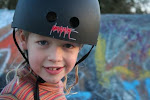We got a letter from the local ESD (Education Service District) recently. They used paper, envelope, postage, and about 250 words to say "Please tell us if you move your homeschooled kid out of the district or enroll him in school." An email would have sufficed, and saved the district a buck or two and us the recycling. I asked Trinidad if he wants to go to school. "NO!"
The other day the kids got to wondering how long a blue whale is. So Kristin and they found a tape measure and went out to the street to measure. It was only a 25' tape, so they learned how to add the measurements together to get the whole. It stretched from the fire hydrant at the corner across our neighbor's lot and almost all of ours. Then they measured how high they climb in the willow tree (25') and how high the treehouse is (10').
We practice a form of homeschooling called "unschooling," which operates without any curriculum at all. It's a system pioneered by John Holt, author of How Children Fail, How Children Learn, and Learning All the Time – books which were influential in developing our homeschool style. As unschoolers, the boys are not involved with any homeschool group – there is at least one local group, which offers some classes and gatherings – and they are perfectly happy to be outside the school system. Instead they have a remarkable amount of freedom, and with it, a remarkable amount of opportunity.
But without curriculum, how do they learn what they need to know?
It does create some disjointed learning processes. For instance, the boys really got into math last winter. They printed out blanks, and then filled in times tables. They got some math workbooks, and spent hours doing the problems, from simple addition to some basic division. Then, as summer harvest and the house addition began to absorb our time, and their friends started summer vacation, math fell by the wayside. The kids were too busy playing with their friends in the kid-pack that floats from house-to-house up and down our street, Kristin too busy harvesting, me too busy building. Last night, as they played Scrabble, I noticed that they'd forgotten a lot of their addition. I helped them out for awhile. When I got tired, they still wanted help with the math, so I found an addition workbook and said they could add up the score on the margins. They got distracted and started working on the problems in the book while I went to bed. And rapidly regained what they had lost.
I got to thinking about it.
How do we, as adults, learn what we need to know?
We learn when we are ready, when we need to know. Nobody tells us we have to – the need is there, it stimulates the desire, we seek the knowledge, and we learn. I didn't learn much in school. I was interested in history and geography, and read books like Bruce Catton's Civil War, and The Rise and Fall of the Third Reich, that enabled me to frequently spot the inaccuracies in my school textbooks. High school history was so pointless that I used to hide novels inside my textbook and read them during class. I learned nothing about carpentry – I learned that on the job. I didn't learn to tie knots, splice line, sew web, maintain diesel engines, or start a fresh-water maker in school – I learned that working on a fishing boat. I learned nothing about design and architecture, my chosen field – I went to college, and followed it up with on-the-job training. I didn't learn to run a business until I started one. When I started work as a building official, I knew almost nothing about building code – now I can cite probably hundreds of code regulations.
Kids are no different. When Sam was five years old, he loved Magic Treehouse books. When his parents didn't have time to read to him, he needed to learn to read. He taught himself, with help from us. Now, at six, he reads at the 8th or 9th grade level.
But what if he had been in school? The demand to learn would be there, but the need might not. Or, he might have been too busy studying things he wasn't interested in (science?) to teach himself to read. I suspect he would have learned to read anyway. The need to learn is intrinsic to our human curiosity. If we aren't interested in something, if it doesn't have meaning in our lives, we won't learn it – or at least, not very well. If we are interested in it, if it has meaning in our lives, we will learn – and almost nothing can hold us back.
Feminism is the philosophy that women are people, too. Unschooling is the philosophy that kids are people, too.
School curricula, by removing the learning from the context, the readiness to learn it, the need for it and the meaning behind it, lowers the intrinsic motivation to learn. It is destructive. The best curriculum is to follow your heart.







